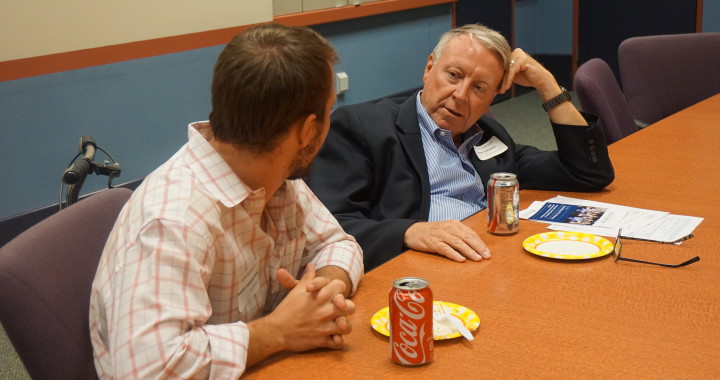Anyone familiar with Rice’s School of Engineering knows that Dean Ned Thomas is a passionate believer in what he calls “The Three Ships –” internships, entrepreneurship and leadership. Now, there’s another “ship” on the horizon, mentorship, to enhance participants’ experience in the Rice Center for Engineering Leadership’s Certificate Program.
True to Rice’s student-governed roots, when RCEL Executive Director Kazimir Karwowski suggested a mentorship program for RCEL students, the students took the idea and ran with it. That led to a committee made up of students and RCEL staff working together to match students with mentors.
“I suggested a mentorship program, but really wanted the students’ involvement,” said Karwowski. “The student leaders loved the idea and took ownership from day one. The RCEL Mentorship Student Committee, with the help of [RCEL staff member] Amanda Prestia, really took control of the program and put in a lot of work to getting it going.”
The program officially launched last fall and, as it comes to the end of its first full year, both participants and mentors agree that it has been tremendously beneficial.
“It’s been invaluable,” said Emma Baker, a sophomore mechanical engineering major, who is paired with Rice alumus Al Hirshberg ’82. Hirshberg earned his degree in mechanical engineering and is now the executive vice president overseeing production, drilling and projects for ConocoPhilips. “It’s extremely helpful to have someone in the industry to talk to about my career path and the choices I make, as well as someone who knows Rice and can offer advice about classes.”
Baker and Hirshberg have met in person, corresponded via email and talked on the phone. Baker said he’s helped her determine what courses she should consider, and has helped her evaluate internship opportunities.
“Emma has asked a lot of good questions,” said Hirshberg. “A lot of students look at a mentorship and basically say, ‘Can you get me a job at your company?’ That’s not Emma’s position at all. She’s interested in figuring out what a career in engineering means, and she wants to know what engineers do in the real world.”
Hirshberg said he has encouraged her curiosity and urged her to stretch herself as an engineer. Last summer, she took a position at a small company, Arup, and worked on the firm’s high speed rail project. This year, she’ll take on another aspect of transportation, working in GE’s transit division. Hirshberg told her the move would help her compare and contrast how large and small companies work, so that she can determine the advantages and disadvantages of both.
“I’m a big mentoring champion,” he said. “I’ve had great mentors along my career, and I’ve done mentoring in a lot of settings over the years. I think it’s a great way to make an impact on someone’s life.”
Iker Wang is another sophomore in the program, majoring in mechanical engineering and statistics. His mentor is Andy LaBaw ’14, a subsea operations engineering at BP.
“As an international student, I wanted someone who could talk to me about how things happen in American industries, how the culture works, so I can have a better idea of the career path I can take after graduation,” said Wang, who’s from Shenzhen, China. He and LaBaw have met multiple times, and before each meeting, they share a list of topics they’d like to discuss via email.
“He’s also from Martel College, which is my college, so we meet there,” said Wang. “He’s been helpful in showing me how to set goals and encouraging me to be more involved in Rice culture, as well as sharing his experience as an engineer with me.”
Wang has taken part of that advice to heart; this fall, he’ll serve as an O-Week coordinator for Martel.
“One of the thigs I’ve learned from him is that it’s crucial to get to know more people, and that’s one of the reasons I decided to be an O-Week coordinator. It was also a chance for me to share my own experiences as an international student with others who might be making that same transition from another country to Rice.”
The experiences of Wang and Baker show just how personalized the mentorship program can be. It gives students and mentors the opportunity to discover what topics, career paths and interests each has, and figure out the best way for mentors to assist their mentees.
“RCEL has been going gangbusters,” said Ned Thomas, William and Stephanie Sick Dean of Engineering. “They’ve done well, and their student leaders have done well; many RCEL students have leadership roles in other organizations on campus. The mentorship program is a natural next step in RCEL’s growth.”
Thomas was so supportive of the program, he became a mentor himself. His mentee is Massey Branscomb and the pair have met a few times to discuss what it means to be an engineer.
“Part of why I wanted to do this was to see firsthand what RCEL is doing, and what’s happening on the ground here in engineering at Rice,” said Thomas. “And it’s interesting to talk with undergraduates, to find out what their concerns are about courses or what’s happening in their departments. I love their interest and enthusiasm.”
Thomas said mentoring has helped him connect with the student body, and he has enjoyed sharing his professional experiences with Branscomb. He’s offered advice about what a career path in engineering looks like, and thinks that the mentorship program is a great way for Rice alumni to not only share their stories, but to re-connect with the university.
“Being a mentor is a great way to find out what students are doing and see how your involvement makes an impact on their education and their lives. “
RCEL is currently seeking both mentors and students who would like to be mentored. For more information, click here.
Holly Beretto, Engineering Communications
April 4, 2016
Originally posted on Rice Engineering News

